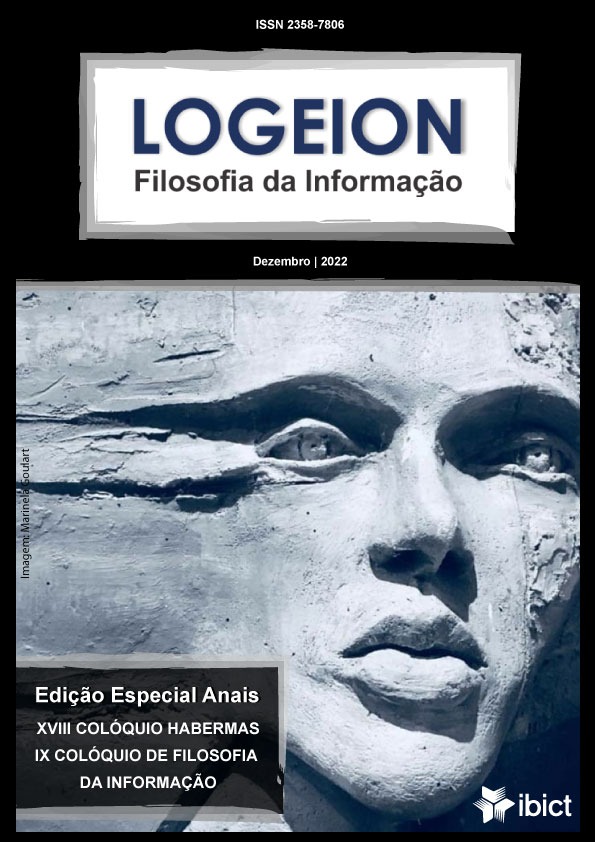Usuário e recuperação da informação
hiato ou ditongo?
DOI:
https://doi.org/10.21728/logeion.2022v9nesp.p482-495Keywords:
Information science. Libraries. Librarians.Abstract
In the scope of Librarianship and Information Science, the user is seen, in theory, as the direction, as the guide of all actions developed by informational equipment. This is just a speech, contrary to the practice of professional librarians in their work with information. The user, from this conception, is understood as the main subject of the process, not only of reference, but encompassing all actions of libraries or, expanding, of informational equipment. An alleged concealment of interference, both from space and from those who work in it, tends to defend an impossible neutrality. Such neutrality, from the point of view of Librarianship and Information Science, would be evidenced by choosing the user as the ultimate purpose of what libraries and librarians do. With this look in perspective, we need to point out and discuss, in more detail, some items: - The first of them, and not necessarily in order of importance, is the idea that everything is done for the informational subject (or any other denomination present in the literature of the area and employed by those who work in it and those who formally research it) and the entire organization of the library is aimed at satisfying the informational needs, desires and interests presented by the user. This is not what actually happens and this is one of the proposals to be addressed in this text.
Downloads
References
ALMEIDA, M. A. de. Oswaldo Francisco de Almeida Júnior. InCID: Revista de Ciência da Informação e Documentação, [S. l.], v. 7, n. 1, p. 201-217, 2016. DOI: 10.11606/issn.2178-2075.v7i1p201-217. Disponível em: https://www.revistas.usp.br/incid/article/view/113824. Acesso em: 17 out. 2022.
ALMEIDA JUNIOR, Oswaldo Francisco de. Biblioteca pública: avaliação de serviços. Londrina: Eduel, 2003.
CHAUÍ, Marilena. A ideologia da competência. In: CHAUÍ, Marilena. A ideologia da competência. Belo Horizonte: Autêntica; São Paulo: Fundação Perseu Abramo, 2014 (Escritos de Marilena Chauí, 3).
DOSTOIÉVSKI, F. Duas narrativas fantásticas: A dócil e O sonho de um homem ridículo. 3. ed. Trad. Vadim Nikitin. São Paulo: Ed.34, 2011.
KURZ, Robert. A ignorância da sociedade do conhecimento. Folha de São Paulo, Caderno Mais, p.14-15, 13 de janeiro de 2002.
MORAES, Rubens Borba de. Testemunha ocular (Recordações). Organização e notas de Antonio Agenor Briquet de Lemos. Brasília: Briquet de Lemos, 2011.
RABELLO, Rodrigo. “Usurários” de informação: notas quase ficcionais. INFOhome, abr. 2021. Disponível em: https://www.ofaj.com.br/colunas_conteudo.php?cod=1296 Acesso em: 21 out. 2022.
RABELLO, Rodrigo; ALMEIDA JUNIOR, Oswaldo Francisco. Usuário de informação e ralé estrutural como não público: reflexões sobre desigualdade e invisibilidade social em unidades de informação. Informação & Sociedade: Estudos, João Pessoa, v.30, n.4, p. 1-24, out./dez. 2020.
SANDERSON, Brandon. Alcatraz contra os bibliotecários do mal. São Paulo: Benvirá, 2010.
SOUZA, Francisco das Chagas de. O ensino da Biblioteconomia no contexto brasileiro. Florianópolis: Editora da UFSC, 1993.
Downloads
Published
Issue
Section
License
Copyright (c) 2023 Logeion: Filosofia da Informação

This work is licensed under a Creative Commons Attribution-NonCommercial-ShareAlike 4.0 International License.
The journal is published under the Creative Commons - Attribution - Noncommercial - Share Alike 3.0 Brazil.
The published work is considered collaboration and therefore the author will not receive any remuneration for this as well as anything will be charged in exchange for publication.
All texts are responsibility of the authors.
It’s allowed partial or total reproduction of the texts of the magazine since the source is cited.




